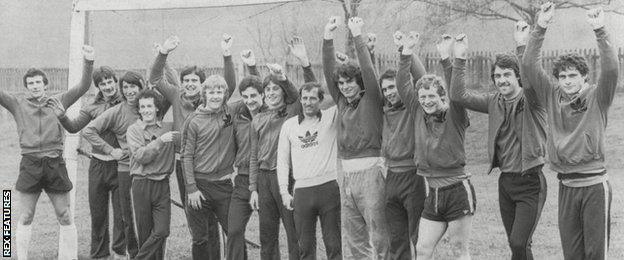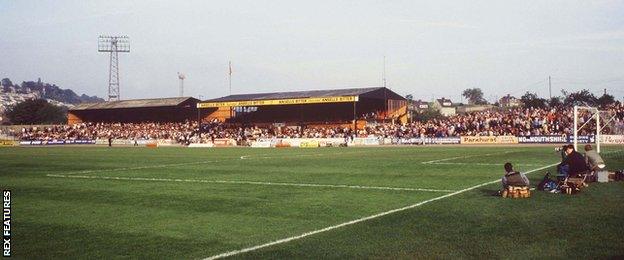Newport County: The fraught 30-year journey from bankruptcy to FA Cup heroes
- Published
The fall and rise of FA Cup giant-killers Newport County
Newport County went out of business exactly 30 years ago - a fact hard to imagine after their lucrative FA Cup heroics this season.
Relegated from the Football League, the Ironsiders, as they were known, were wound up owing a sum of £330,000 on 27 February 1989, after being evicted from their Somerton Park ground.
A few seasons removed from the club's golden era, where they reached the quarter-finals of a major European competition, Newport, under the ownership of American Jerry Sherman, went from a club thriving at the start of the decade to one that ceased to exist by the end of it.
The road back was long and fraught, as the Exiles rose from the ashes, from a nomadic existence as a homeless club in the Hellenic League, to FA Cup giant-killers taking on the might of Pep Guardiola's Manchester City.
This is their story.

Newport County's greatest ever side? The 1980 team pose together
The glory years disappear
Formed in 1912 and nicknamed the Ironsiders due to their proximity to the local steelworks, County started out in the Southern League, eventually reaching the Fourth and Third Divisions, narrowly avoiding relegation out of the Football League in the late 1970s.
However, under managers Len Ashurst and then Colin Addison, County enjoyed a fantastic period of success in the 1980s, gaining promotion to Division Three in 1980 with a young John Aldridge and strike partner Tommy Tynan firing in the goals.
The Ironsiders also won the Welsh Cup, meaning entry to the 1981 European Cup Winners' Cup, where they lost 3-2 on aggregate to Carl Zeiss Jena in the quarter-final, with the second leg played out in front of a crowd of almost 20,000 at Somerton Park. Only a questionable goal-line decision denied Newport a high-profile semi-final with Benfica.
The following season County came within four points of promotion to Division Two, but the bad times were just around the corner.
With Sherman now their owner - a man who promised much, delivered little and in 2007 went to prison in the US for defrauding the parents of a junior hockey team - County were relegated from the Third Division in 1987 and in 1988 finished bottom of the Fourth Division with just 25 points.
With their situation by then financially perilous, County sold Somerton Park to the council to try to ease their burden, but with no major assets to their name as their league position and financial status went into freefall, County were on the brink.
They failed to finish their first season in the Conference, and were expelled from the division with their results expunged as they went out of business on 27 February 1989 with debts of £330,000.
The club was officially dead, with an auction to sell off their remaining possessions the final indignity. It raised just £12,000.

Somerton Park was turned into housing
Reformation but without a home
With the backing of 400 supporters and led by club president David Hando, the club reformed as Newport AFC and entered the Hellenic League, but former allies of the club were now seemingly foes rather than friends.
Newport Council thought the club too closely associated with the one which went out of business and refused to allow a return to Somerton Park, while the Football Association of Wales took the other stance, saying the club had nothing to do with the original County, meaning they had to start again at the bottom, playing parks football in England.
Newport had no choice but to become a Gloucestershire club, eventually finding a home at Moreton-in-Marsh, some 85 miles from Newport in the Cotswolds. Hando recalls every club in their contacts book from A-L turned them down.
Promotion to the Beazer Homes League led to a brief return to Somerton Park, but the stadium was increasingly in a state of disrepair.
A further threat to County's future came with the establishment of the Welsh Premier League in 1992, which Newport were asked to join. When they refused, seeking instead to satisfy the dream of a Football League return, they were again barred from playing in Wales, forcing a groundshare with Gloucester City.
Newport took the FAW to the high court for restraint of trade and won, but by the time they were allowed to return to Wales, the bulldozers had already flattened Somerton Park. Newport finally returned 'home' at the newly-built Newport Stadium, a joint-facility shared with Newport Harriers Athletics Club, in time for the 1994-95 season.

Newport's former boss Dean Holdsworth and skipper Gary Warren celebrate promotion. Holdsworth left the Exiles to join Aldershot Town.
Baby steps on return to Football League
Re-branded in 1999 as Newport County AFC, the Exiles, so named for their travels around Gloucestershire, reached the Southern League Premier at the turn of the century, before gaining entry into the Conference South, where they toiled for years.
It was not until 2009-10 under the management of ex-Premier League striker Dean Holdsworth that the club returned to the Conference, the division they were in when they went bust.
This redemption story was almost complete and in style, as County finished the season with a Conference South record 103 points, 28 ahead of nearest rivals Dover Athletic.
Holdsworth departed, but in 2011 the club made another shrewd appointment, with former Spurs defender Justin Edinburgh taking charge.

Justin Edinburgh left Newport for Gillingham and is now boss of Leyton Orient
Edinburgh avoided relegation from the Conference which had seemed likely and built momentum at the club, who enjoyed a double boost in 2012, with a move to the city centre as tenants at rugby ground Rodney Parade followed by news that Les Scadding, a Euro Millions jackpot winner, was joining as chairman and willing to invest some of his £45m fortune.
One hundred years after their original formation, County finally returned to the Football League as a third-placed finish allowed a play-off final win at Wembley over Welsh rivals Wrexham, with current manager Michael Flynn part of the triumphant team.
The Great Escape: This is Newport County's story
A Great Escape and FA Cup heroics
Four years after their Wembley win, things were again looking bleak for Newport, now fan-owned after Scadding sold the club back to supporters having invested over £1m that is still being paid back, interest free.
The Exiles were 11 points adrift with 12 games remaining in League Two and turned to Flynn, a Newport boy, as caretaker boss. At least they could go down giving their fans hope.
However, Flynn produced miracles and somehow, if Newport won their final game of the season, at home to Notts County, survival would be secure.
They were drawing 1-1 in injury time, before Mark O'Brien scored one of their most famous goals. Once again, County had picked themselves off the canvas.
Since ensuring they stayed as part of the elite 92, Newport have enjoyed two incredible FA Cup campaigns, beating Leeds United and drawing with Tottenham Hotspur last season before this term stunning Leicester City and Middlesbrough before playing Manchester City in front of a record crowd.
The FA Cup alone in the past 12 months has netted the Exiles around £2m.
It makes it all the harder to comprehend that the club was liquidated for just £330,000 of debt 30 years ago today.
It's been quite the journey ever since, the ultimate rise from the ashes for a club that have simply never known when they are beaten.